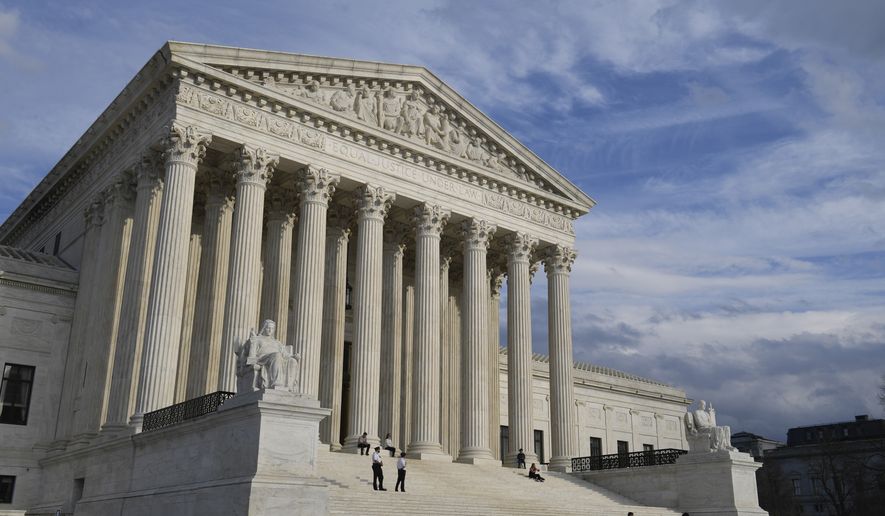The Supreme Court heard the first challenge to the Second Amendment in nearly a decade Monday, raising party-line concerns about New York City’s restrictive ban on transporting firearms.
The justices weighed a challenge against a regulation in New York City that prevented licensed firearm owners from transporting their weapons in and out of the area.
The legal battle was brought by gun rights activists after a federal appeals court upheld a city ordinance that allowed licensed residents to take their firearms outside of their homes to only seven shooting ranges within the city, thus prohibiting them from transporting the weapons to a second home or a range outside of the city.
New York City, though, changed the regulation, amending it so that licensed firearm owners can transport their handguns to shooting ranges and second homes outside of the city limits. The officials contend that move settles the lawsuit and want the court to dismiss the challenge as “moot.”
That argument was welcomed by several of the Democrat-appointed justices, who suggested the gun rights groups got what they wanted with the change in laws.
“You’re asking us to take a case where the other side has thrown in the towel,” Justice Sonia Sotomayor said.
Justice Ruth Bader Ginsburg asked what was left of the case.
Justice Neil M. Gorsuch and Justice Samuel A. Alito Jr., though, thought there was still a controversy to be examined, asking whether a stop for coffee or to help a relative would run afoul of the city’s strict rules when moving licensed firearms in and out of the city limits.
New York amended the regulation to allow firearms to be transported to second homes, so long as its legal to possess the firearm there, and also gun ranges outside the area.
Chief Justice John G. Roberts Jr. quizzed the attorney representing the city as to what prejudices the gun rights groups may face if the case were dismissed.
Observers on both sides of the issue are watching closely for clues as to whether the high court could use the case to expand gun rights, as it is the first time since 2010 the court will really grapple with the reach of the constitutional right to keep and bear arms.
In 2008, the court in its 5-4 Heller ruling held the Second Amendment guarantees the right to keep and bear arms, striking down a regulation in the District of Columbia restricting the licensing of firearms and requiring gun owners to keep their weapons inside the home, dismantled.
Two years later, the court in another 5-4 ruling extended that protection to the states, striking down gun bans in Illinois.
Despite New York’s alteration of the regulation to appease the challengers, the high court decided to keep oral arguments on schedule for Monday — but the justices told the two sides they could address whether or not the challenge is now moot.
Justice Alito said the changing of the law after the Supreme Court decided to grant the appeal was an “extraordinary” move by the city.
But Richard Dearing, the attorney for New York City, contended it’s a “good thing, not a bad thing” when local government responds to litigation issues.
Jeffrey Wall, deputy solicitor general for the U.S., sided with the gun rights groups in arguing such transportation bans have been “rare.”
Josh Blackman, a law professor at South Texas College of Law, said he predicts the court may dismiss the case as moot.
“The important question is how: quickly, through an unsigned opinion, or at the end of the June, with a fully developed opinion on mootness. The former option would allow the court to add another Second Amendment case to its docket, perhaps from New Jersey,” Mr. Blackman said.
He was referring to a case involving a New Jersey requirement that people show a “justifiable need” to legally carry a firearm, which has been appealed by gun rights advocates to the high court.
Ilya Shapiro, publisher of the Cato Institute’s Supreme Court Review, said public interest advocates should root against the case being decided as moot.
“It’s clear that the court wants to return to the Second Amendment. After more than a decade of abdicating its responsibility to flesh out this area of law and to stop the civil disobedience in lower courts hostile to the right to bear arms, there are plenty of good cases waiting in the wings,” he said.
• David Sherfinski can be reached at dsherfinski@washingtontimes.com.
• Alex Swoyer can be reached at aswoyer@washingtontimes.com.




Please read our comment policy before commenting.